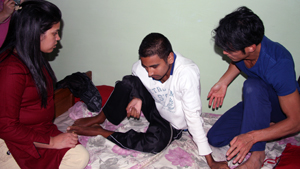Carol Scovil's trip to train Nepalese health-care professionals reminded her how well-resourced health care is in Canada. She and her team also left with lessons to take home to Toronto Rehab's Lyndhurst Centre.
Carol, an Assistive Technology Consultant in Toronto Rehab's Spinal Cord Injury Rehabilitation Program, travelled to Nepal in November 2011 with three colleagues – Sylvia Haycock, Jamie Young and Pauline Courcy – as part of the NepalAbility initiative to help provide inter-professional, hands-on training to health-care professionals.
 The incidence of spinal cord injury in Nepal is significant: 300 to 5,000 traumatic cases a year. Rehabilitation for spinal cord injury is relatively new in Nepal; it began a program in 1997, which has been enhanced by the education and training support from several non-government organizations, like the Toronto-based NepalAbility.
The incidence of spinal cord injury in Nepal is significant: 300 to 5,000 traumatic cases a year. Rehabilitation for spinal cord injury is relatively new in Nepal; it began a program in 1997, which has been enhanced by the education and training support from several non-government organizations, like the Toronto-based NepalAbility.
"Many clinicians in Nepal have a solid background in spinal cord injury care, but are now keen to develop clinical skills and learn how to deal with more complicated issues of case management and complex clinical decision making," says Carol.
The team spent significant time before arriving in Nepal adapting spinal cord injury education and training to fit the Nepalese context. They considered situations such as how to do intermittent catheterizations without running water and clean supplies, how to advise on pressure sore prevention when there is little or no medical equipment, and how to teach wheelchair skills in the foothills of the world's tallest mountain range.
Once in Nepal, the team realized the value and power of inter-professional care, especially with the absence of certain technologies.
"While on this trip to Nepal, I confirmed my belief and practice that perseverance while developing individual and team relationships are key factors in the successful delivery of rehabilitation services in any context," says Sylvia, an Occupational Therapist in the Spinal Cord Injury Rehabilitation Program.
During the three-week visit, the team provided practical, hands-on workshops, training and coaching to approximately 80 Nepalese health care professionals. They demonstrated models of inter-professional collaboration for direct patient care and focused on team building in the nursing and occupational therapy departments. The team also shared spinal cord injury best practices applied to the Nepalese context. For example, they trained their Nepalese colleagues how to prevent a bladder infection, and how to enhance home accessibility for their patients.
"I came away from our three weeks inspired by the quality of rehabilitation health professionals in Nepal are able to provide, despite limited resources, and their ability to creatively find good rehab solutions from the resources they do have," reflects Carol. "This is an approach our team can apply to our work at Lyndhurst Centre."
